#russian setbacks in ukraine
Text
President Zelensky visits recaptured Ukrainian city of Izyum: Report 14Sep 202
President Zelensky visits recaptured Ukrainian city of Izyum: Report 14Sep 202
President Zelensky visits recaptured Ukrainian city of Izyum
President Volodymyr Zelensky leaves for the recaptured city of Izium, a major logistics hub in north-eastern Ukraine.
During his visit, Mr. Zelensky thanked the soldiers who took part in the counter-offensive against the Russian occupiers.
He oversaw a flag-hoisting ceremony and said that the flag of Ukraine would return to every city…

View On WordPress
#captured#city#humanitarian crisis#president zelensky#president zelensky visits recaptured ukrainian city#russia ukraine crisis#russia&039;s invasion of ukraine#russian invasion of ukraine#russian setbacks in ukraine#russian ukraine news#ukraine counter offensive#ukraine president#ukrainian#ukrainian city#ukrainian forces#ukrainian president#ukrainian refugees flee#ukrainians#volodymyr zelensky#Volodymyr Zelenskyy#world vision australia#zelensky#zelensky statement#zelensky war news
0 notes
Text
Western officials say Russian Black Sea fleet is in defensive posture after setbacks, including Crimea attack
Western officials say Russian Black Sea fleet is in defensive posture after setbacks, including Crimea attack
A serviceman with a Russian flag on his uniform stands guard near the Zaporizhzhia nuclear plant on August 4. (Alexander Ermochenko/Reuters)
A delegation from the International Atomic Energy Agency may be able to visit the Zaporizhzhia nuclear power plant in early September, according to Mikhail Ulyanov, the Russian representative in Vienna where the IAEA is based.
Ulyanov said during an online…

View On WordPress
#attack#Black#Crimea#defensive#Europe#fleet#including#Live updates: Russia&x27;s war in Ukraine#Officials#posture#Russian#Sea#setbacks#Western
1 note
·
View note
Text
Decolonisation is beautiful.
Here’s just one example from one small corner of one small Estonian town, Viljandi.

Picture 1: An ugly communist party building and car park, built by the soviet occupiers on top of a memorial they demolished for local people who died fighting for independence.

Pictures 2 & 3: The memorial, lovingly recreated down to every last detail, is back at the heart of a public square.
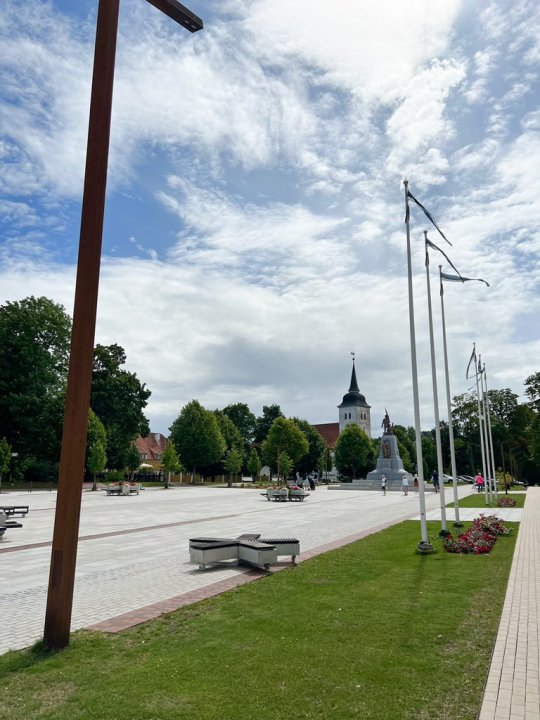
There are some commentators abroad who like to lecture russia’s neighbours not to “erase history” by removing the scars of occupation.

It’s weird because this kind of thing is normal everywhere else in the world. In fact, the very same people who get particularly upset about occupation monuments being removed here also tend to be very articulate about the importance of removing statues to ousted oppressors elsewhere. They just think russian imperialism gets a free pass.
Newsflash: It doesn’t.
Rather than erase history, plenty of occupation junk across the Baltic countries has been transferred to museums so that future generations can learn about it in its proper context. But it doesn’t belong in our public spaces. Local people here hated that brutal communist party building, which desecrated the memorial in a way so symbolic of the wider ugliness of russian imperialism.
Public spaces belong to the people who actually live here and should reflect the kind of free, modern, open, independent countries that we are - and which remember those who made it possible.
The other bad take on this issue is to constantly frame this kind of thing as a ‘reaction/response/message to russia’. That, again, is imperialist thinking. We make decisions for our countries based on what we want our countries to be. We’d want to remove this kind of junk even if russia had ceased to exist in 1991 or if it had flourished into a friendly democracy.
In fact, here in Viljandi, it took three decades of planning and sculpting to recreate the monument based off grainy photos of the original. The building was finally knocked down a couple of years ago and the memorial unveiled this midsummer.
In the interim, the building was expanded after the occupation to serve as Tourist Information, which was pretty ironic considering the communist aim was to keep us closed to the world. But that has a new home and the time has come to return the space.
There was quite a debate locally about whether to recreate it exactly or update it with some kind of modern reinterpretation. Both are legitimate, interesting ideas.
In the end, the only difference is that the materials are now of a much higher quality. I think they made the right decision.
And the fact that it was recreated in perfect detail by people who never saw the original but emerged from occupation with the same determination to live free does send its own new message from our time too. We will continue to exist.
Decolonisation can suffer setbacks, horrendously painful as we see in Ukraine, but the long term trend is unstoppable. The special protection that russian imperialism still enjoys in the minds of many around the world is starting to shatter.

I stopped by to take a photo of it for you all and a rainbow appeared. 🙂
#decolonisation#viljandi#estonia#soviet times#russian imperialism#ukraine resistance#stop russian invasion#putin war criminal#ukraine war#help ukraine#i stand with ukraine#slava ukraini#give weapons to ukraine
288 notes
·
View notes
Text
US Threats led to rupture of vital military ties, Nigerien leader says - WaPo
A crucial military relationship between the United States and its closest West African ally, the country of Niger, ruptured this spring after a visiting U.S. official made threats during last-ditch negotiations over whether American troops based there would be allowed to remain, according to the country’s prime minister.
In an exclusive interview, Prime Minister Ali Mahaman Lamine Zeine put the blame for the breakdown squarely on the United States, accusing American officials of trying to dictate which countries Niger could partner with and failing to justify the U.S. troop presence, now scheduled to end in the coming months. Niger has been central to efforts to contain a growing Islamist insurgency in West Africa.
The rift between the former allies has created an opportunity for Russia, which has moved quickly to deepen its relationship with Niger, dispatching troops to the capital, Niamey, last month to train the Nigerien military and supplying a new air defense system. Russian and U.S. troops now occupy opposite ends of an air base.
After a military coup d’état ousted Niger’s democratically elected president last year, the United States froze security support as required by U.S. law and paused counterterrorism activities, which had involved intelligence gathering on regional militant activities from a massive drone base in the country’s north. The United States has kept more than 1,000 military personnel in place while negotiating with Niger over their status and urging the junta to begin restoring democracy.
“The Americans stayed on our soil, doing nothing while the terrorists killed people and burned towns,” Zeine said. “It is not a sign of friendship to come on our soil but let the terrorists attack us. We have seen what the United States will do to defend its allies, because we have seen Ukraine and Israel.”
Niger’s insistence that American troops depart culminated in the U.S. announcement last month that it would withdraw them. The pullout, which two U.S. officials said would begin in coming months, represents a significant setback for the Biden administration and will force it to reconfigure its strategy for countering Islamist extremists in the volatile Sahel region.
Though tense discussions between U.S. and Nigerien officials have been previously reported, Zeine’s remarks revealed the extent of the disconnect between the two countries. While the Americans were pressing their counterparts over democracy and their relations with other countries, Niger was asking for additional military equipment and what it considered a more equitable relationship between the two forces, according to his account. He also revealed just how exasperated the Nigeriens had become with the United States.
Relations with the United States have been strained since the junta took power, appointing Zeine, an economist, as prime minister two weeks later. The U.S. government condemned the coup and called for the release of President Mohamed Bazoum, who was put under house arrest.
Zeine said leaders of Niger’s new government, known as the National Council for Safeguarding the Homeland, or by its French initials CNSP, were bewildered that the United States had frozen military support while insisting on keeping the troops in the country without justifying their continued presence. The American response in the wake of Niger’s coup contrasted sharply with that of other nations, including Russia, Turkey and the United Arab Emirates, he said, which have welcomed the new Nigerien leaders with “open arms.”
He said the Nigerien leaders took particular umbrage at remarks by Molly Phee, the State Department’s top official for African affairs, who he said had urged the government during a March visit to Niamey to refrain from engaging with Iran and Russia in ways objectionable to Washington if Niger wanted to continue its security relationship with the United States. He also said Phee had further threatened sanctions if Niger pursued a deal to sell uranium to Iran.
“When she finished, I said, ‘Madame, I am going to summarize in two points what you have said,’” recounted Zeine, who has led negotiations with the United States. “First, you have come here to threaten us in our country. That is unacceptable. And you have come here to tell us with whom we can have relationships, which is also unacceptable. And you have done it all with a condescending tone and a lack of respect.”[...]
Since 2012, the United States has maintained a military presence in Niger, with most U.S. personnel stationed at the Agadez drone base, which cost about $110 million to build. That base has been “impactful” for counterterrorism efforts across the region, said Gen. Michael E. Langley, who heads U.S. military operations in Africa. In an interview earlier this year, Langley warned that the U.S. losing its footprint in Niger would “degrade our ability to do active watching and warning, including for homeland defense.”[...]
When Phee first arrived in Niger in December, Zeine said, he showed her photographs of Nigeriens waving American flags during protests against France, Niger’s former colonial power. While protesters set fires and smashed windows at the French Embassy, he noted, they left the U.S. Embassy untouched.
“Nigeriens were saying, ‘Americans are our friends, they will help us this time to annihilate the terrorists,’” said Zeine. “But there was radio silence.” He added that Niger would have not looked to Russia and other countries for help if the United States had responded to requests for more support, including for planes, drones and an air defense system.[...]
Although Niger is insisting that the U.S. military leave, Zeine said that his government wants to continue economic and diplomatic relations with the United States and that “no Nigerien considers the United States as the enemy.” He said he told Phee and Campbell that Niger would rather have American investors than soldiers.
“If American investors arrived, we would give them what they wanted,” he recounted telling the States Department officials. “We have uranium. We have oil. We have lithium. Come, invest. It is all we want.”
14 May 24
49 notes
·
View notes
Text
From Taiwan and Finland in January to Croatia and Ghana in December, one of the largest combined electorates in history will vote for new governments in 2024. This should be a cause of celebration and a vindication of the power of the ballot box. Yet this coming year is likely to see one of the starkest erosions of liberal democracy since the end of the Cold War. At their worst, the overall results could end up as a bloodbath or, marginally less bleakly, as a series of setbacks.
At first glance, the stats are impressive. Forty national elections will take place, representing 41 percent of the world’s population and 42 percent of its gross domestic product. Some will be more consequential than others. Some will be more unpredictable than others. (You can strike Russia and Belarus from that list.) One or two may produce uplifting results.
However, in the United States and Europe, the two regions that are the cradles of democracy—or at least, that used to project themselves as such—the year ahead is set to be bracing.
It is no exaggeration to say that the structures established after World War II, and which have underpinned the Western world for eight decades, will be under threat if former U.S. President Donald Trump wins a second term in November. Whereas his first period in the White House might be regarded as a psychodrama, culminating in the paramilitary assault on Congress shortly after his defeat, this time around, his menace will be far more professional and penetrating.
European diplomats in Washington fear a multiplicity of threats—the imposition of blanket tariffs, also known as a trade war; the sacking of thousands of public officials and their replacement with politicized loyalists; and the withdrawal of remaining support for Ukraine and the undermining of NATO. For Russian President Vladimir Putin, the return of Trump would be manna from heaven. Expect some form of provocation from the Kremlin in the Baltic states or another state bordering Russia to test the strength of Article 5, the mutual defense clause of the Western alliance.
More broadly, a Trump victory would arguably mark the final dismantling of the credibility of Western liberal democracies. From India to South Africa and from Brazil to Indonesia, countries variously called middle powers, pivot countries, multi-aligned states—or, now less fashionably, the global south—will continue the trend of picking and choosing their alliances, seeing moral equivalence in the competitive bids on offer.
The greatest effect that a Trump return could have would be on Europe, accelerating the onward march of the alt right or far right across the continent. Yet that trend will have gained momentum long before Americans go to the polls. French President Emmanuel Macron and German Chancellor Olaf Scholz are looking over their shoulders as the second wave of populism affects the conduct of government.
The wedge issue that is threatening all moderate parties is immigration, just as it did in 2015, when former German Chancellor Angela Merkel allowed in more than 1 million refugees from the Middle East in what is now seen as the first wave of Europe’s immigration crisis. This time around, the arguments propagated by the AfD (the far-right Alternative for Germany party), Marine Le Pen’s National Rally in France, and similar groups across the continent have permeated the political mainstream.
The past 12 months have seen European Union decision-making constantly undermined by Prime Minister Viktor Orban in Hungary, particularly further support for Ukraine. For the moment, he stands alone, but he is likely to be joined by others, starting with the newly returned Prime Minister Robert Fico in Slovakia. Italian Prime Minister Giorgia Meloni has struck a tacit deal with Brussels, remaining loyal on supporting Ukraine (against her instincts and previous statements) in return for effectively being given carte blanche in Italy’s domestic politics.
In September, Austria seems almost certain to vote in a coalition of the far right and the conservatives. A country that has (ever since the withdrawal of Soviet forces in 1955) prized its neutrality and been keen to ingratiate itself with Moscow has already been uncomfortable giving full-scale support to Kyiv. We can expect that support to soon be scaled back.
One of the few countries with a center-left administration, Portugal, will see it join the pack of the right and far right when snap elections are held in March. The previous incumbent, the Socialist Party’s outgoing Prime Minister Antonio Costa, was forced to quit amid a corruption investigation.
The most explosive moment is likely to occur in June, with the elections to the European Parliament. This reshuffling of the Euro-pack, which happens once every four years, was always seen in the United Kingdom as an opportunity to behave even more frivolously than usual. In 2014, the British electorate, in its inestimable wisdom, put Nigel Farage and his U.K. Independence Party in first place, setting in train a series of events that, two years later, led to the referendum to leave the EU.
Having seen the damage wrought by Brexit, voters in the remaining 27 EU member states are not angling for their countries to go it alone. However, many will use the opportunity to express their antipathy to mainstream politics by opting for a populist alternative. Some might see it as a low-risk option, believing that the European parliament does not count for much.
In so doing, they would be deluding themselves. It is entirely possible that the various forces of the far right could emerge as the single biggest bloc. This might not lead to a change in the composition of the European Commission (the diminished mainstream groupings would still collectively hold a majority), but any such extremist upsurge will change the overall dynamics across Europe.
Far-right parties in charge of governments will see themselves emboldened to pursue ever more radical nativist policies. In countries in where they are junior members of ruling coalitions (such as in Sweden), they will apply further pressure on their more mainstream conservative partners to move in their direction.
Conversely, countries that saw a surprising resurgence of the mainstream in national elections this year are unlikely to see that trend maintained. Spanish Prime Minister Pedro Sánchez’s success in staving off the right was achieved only by cutting a deal with Catalan separatists. This led to protests by Spanish nationalists and a situation that is anything but stable.
Prime Minister Donald Tusk’s victory in Poland was at least as remarkable because the far-right Law and Justice party (PiS) government had used its years in government to try to skew the media and the courts in its direction. Expect PiS gains in June.
The most alarming result of 2023 was the return to prominence, and the verge of power, of Geert Wilders. The Dutch elections provide a how-not-to guide for mainstream politicians. The willingness of the center-right party of the outgoing Prime Minister Mark Rutte to contemplate a coalition with Wilders’s Party for Freedom emboldened many voters who had assumed their vote would be disregarded.
In Europe’s biggest economy, Germany, the so-called firewall established by the main parties to refuse to govern with the AfD is beginning to fray. Already, the conservative Christian Democratic Union (CDU) is working with them in small municipalities. Friedrich Merz, the CDU leader, has dropped hints that such an option might not be out of the question at the regional level.
If the AfD gains the largest number of seats in the June European Parliament elections (opinion polls currently put it only marginally behind the CDU and ahead of all three parties in Scholz’s so-called traffic light coalition), then the momentum will change rapidly. It could go on to win three of the states in the former communist east—Thuringia, Saxony, and Brandenburg—next autumn. Germany would enter unchartered territory.
These dire predictions could end up being overblown. Mainstream parties in several countries may defy the doom merchants and emerge less badly than forecast. Given recent trends, however, optimism is thin on the ground.
There is one election, however, due to take place in the latter part of 2024 that could produce not just a centrist outcome, but one with a strong majority in its parliament. Britain, the country that left the heart of Europe, the island that until recently was run by a clown, could emerge as the lodestar for modern social democracy. The irony would be lost on no one.
79 notes
·
View notes
Text
These are The Best News of Last Week
1. Brazil’s new president Lula vows to halt Deforestation.

For many Brazilians, Bolsonaro’s defeat represents a rejection of the explicit anti-Indigenous, anti-environmental agenda he enacted while in office.
Lula has promised to update Brazil’s climate goals to steer the country back in line with the Paris Agreement. He has also committed to a list of climate proposals put forth by Marina Silva, the most prominent environmental activist in Brazil who served as his former environment minister. In his first speech as president-elect late Sunday night, he reiterated his strong support for zero deforestation in the Amazon. “Brazil is ready to resume its leading role in the fight against the climate crisis”
2. All-terrain wheelchairs arrive at U.S. parks: ‘This is life-changing’

For anyone who has to use a wheelchair, the state says it will soon be easier to be able to enjoy several parks, historic sites and wildlife centers because these locations will provide free all-terrain wheelchairs.
The Georgia Department of Natural Resources said it has partnered with the Aimee Copeland Foundation to provide high-mobility, all-terrain track wheelchairs at 10 different locations across the state. DNR said the initiative “encourages those with mobility impairments to reconnect with nature, explore nature trails, go fishing and attend adaptive hunts.”
3. Electricity-generating windows? Swiss scientists design more efficient transparent solar panels

All that natural light flowing through your windows may one day do much more than brighten your mood. Scientists in Switzerland have reached a new efficiency record for transparent solar cells, paving the way for electricity-generating windows that could help power our homes and devices.
Also known as Grätzel cells, dye-sensitised solar cells (DSCs) are a type of low-cost solar cell that use photosensitised dye attached to the surface of a semiconductor to convert visible light into energy.
4. In France all new large parking lots must now be covered in solar panels starting in july 2023

The new provisions are part of French president Emmanuel Macron’s large-scale plan to heavily invest in renewables, which aims to multiply by 10 the amount of solar energy produced in the country, and to double the power from land-based wind farms.
Starting July 1, 2023, smaller carparks that have between 80 and 400 spaces will have five years to be in compliance with the new measures. Carparks with more than 400 spaces have a shorter timeline: They will need to comply with the new measures within three years of this date, and at least half of the surface area of the parking lot will need to be covered in solar panels.
5. Car horns replace gunfire as Ukraine’s troops return to jubilant Kherson
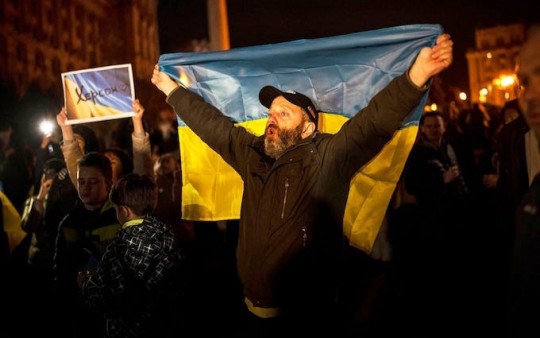
Ukrainian soldiers swept into the southern city of Kherson on Friday, seizing a major symbolic and strategic prize from the retreating Russian army and dealing a bitter blow to President Vladimir V. Putin.
Just weeks after Mr. Putin declared the Kherson region a part of Russia forever, his troops were forced to abandon its capital city, their third major retreat in the war. The setback further dented the once-formidable reputation of an army that has mismanaged logistics and sent unprepared and unmotivated soldiers into battle.
Jubilant crowds poured into the streets, greeting Ukrainian soldiers and waving flags
6. Lab-grown blood given to people in world-first clinical trial

Tiny amounts — equivalent to a couple of spoonfuls — are being tested to see how it performs inside the body. The bulk of blood transfusions will always rely on people regularly rolling up their sleeve to donate.
But the ultimate goal is to manufacture vital, but ultra-rare, blood groups that are hard to get hold of. These are necessary for people who depend on regular blood transfusions for conditions such as sickle cell anaemia.
7. A pod of dolphins got stuck in the mud at low tide — here’s how a N.S. community saved them

According to the Digby Fire Department, there were 16 Atlantic white-sided dolphins, of various sizes, stranded. People of all ages rushed to the scene in Digby on the afternoon of Nov. 4 after it was discovered that 16 dolphins were stranded in the mudflats of an area known as The Joggins.
“We are happy to report that all 16 dolphins eventually were ushered into the water,” the department posted on its Facebook page late in the afternoon. “We are hopeful once the tide keeps rising, they will safely make their way back out to sea.”
- - -
That’s it for this week. If you liked this post you can support this newsletter with a small kofi donation:
Buy me a coffee ❤️
Have a great week ahead :)
523 notes
·
View notes
Text
Sometime, perhaps this winter, when the war is over, and Russia doesn't annex Ukraine - as the whole point is that they don't want a border with NATO, and would prefer buffer states - it's going to be presented in the west as a victory for Ukraine. Something like: 'Russia was going to annex Ukraine, but we fought them off,' even as the L/DPR remain independent and with limited international recognition.
And, I mean, god, we're in for it, aren't we? In a decade or two, when the breakdown of imperialism has escalated from these proxy conflicts into global war, we'll be awash with coverage on how every single setback was actually a victory. It won't be an opinion, it'll be unquestionable, the basic framing - one that every liberal you know won't have to consciously consider. Consider this: Ukraine completely defeated Russia's troops in the Donbass. Then, they dealt decisive blows against them near Odessa. They obliterated column after column of Russian tanks advancing on Kiev. Finally, the heroic troops in Kiev bravely held them off. Victory after victory, even as the front line is pushed backwards!
Every supposed liberal principle was cast aside the second blood was drawn - misinformation was openly declared permissible, if in service of the war effort; blocking refugees from escaping, supported if it meant more conscripts; war crimes, none specifically - just any war crimes, defended as a tactic. The fascist paramilitaries, previously rallied against as an issue by every liberal outlet, denied, then downplayed, and finally, simply, accepted as a necessary evil.
There's nothing, really, to say, here. I think everyone can see where history is leading us. It's a farce. The world powers tried to put their masks back on, after the horrors of the last century, but the bloodstains on them are as clear as day. For good or for bad, we will see the end of it all. In socialism, or in extinction.
634 notes
·
View notes
Text
The Wagner head, Yevgeny Prigozhin, has accused Moscow’s leadership of lying to the public about the justifications for invading Ukraine, in the latest sign of conflict between Vladimir Putin’s government and one of his most important allies.
In an explosive 30-minute video posted on his Telegram channel, Prigozhin dismissed Moscow’s claims that Kyiv was planning to launch an offensive on the Russian-controlled territories in eastern Ukraine in February 2022.
“There was nothing extraordinary happening on the eve of February 24,” Prigozhin said.
“The ministry of defence is trying to deceive the public and the president and spin the story that there was insane levels of aggression from the Ukrainian side and that they were going to attack us together with the whole Nato block,” the Wagner head said.
Shortly after Russia attacked Ukraine, Putin claimed Moscow’s invasion had thwarted Ukraine’s own plans for “a massive attack on the Donbas, and then on the Crimea”.
Prigozhin also said Russia’s leadership could have avoided the war by negotiating with Ukraine’s president, Volodomyr Zelenskiy.
“When Zelenskiy became president, he was ready for agreements. All that needed to be done was to get off Mount Olympus and negotiate with him,” he said.
Prigozhin has been arguing with top military officials for months, blaming the minister of defence, Sergei Shoigu, for battlefield failures.
However, his latest tirade appeared to be a new escalation, as the warlord directly contradicted Putin’s rationale for the invasion, implying it was based on lies in what amounts to the harshest criticism by any prominent Russian war figure of the decision to attack Ukraine.
“What was the war for? The war needed for Shoigu to receive a hero star … The oligarchic clan that rules Russia needed the war,” he said.
“The mentally ill scumbags decided: ‘It’s OK, we’ll throw in a few thousand more Russian men as cannon fodder. They’ll die under artillery fire, but we’ll get what we want,’” Prigozhin continued.
While the warlord was careful not to directly attack the Russian president, Prigozhin did question several decisions made by Putin, including the Kremlin’s decision to exchange more than 100 captured Azov fighters for Viktor Medvedchuk, a close ally of Putin.
And in one instance, Prigozhin appeared to criticise the Russian president for continuing to self-isolate.
“We still have self-isolation in our country, and therefore none of the decision-makers have yet met [with military generals and discussed how to win the war]. They all talked on the phone.”
Prigozhin, whose Wagner troops have pulled back from Bakhmut, also attacked Russia’s current war efforts in the face of Ukraine’s counteroffensive.
Directly contradicting Putin’s claims that Moscow has fended off Kyiv’s counterattack, Prigozhin also accused the Russian military leadership of lying to the public about the scale of its losses and setbacks in Ukraine.
“The Russian army is retreating in all directions and shedding a lot of blood … What they tell us is the deepest deception.”
#current events#politics#russian politics#russo-ukrainian war#2022 russian invasion of ukraine#russia#yevgeny prigozhin#wagner group
88 notes
·
View notes
Text
Russia's new offensive gained momentum Wednesday around Ukraine's second-largest city, the latest gut punch for Kyiv as it struggles to contain this new front in the war following delays in crucial military aid from the United States.
Even as Secretary of State Antony Blinken visited the country to reassure it of allied support and announced a new $2 billion arms deal, Ukrainian President Volodymyr Zelenskyy canceled all upcoming foreign trips — a signal of how seriously the country is taking the advancing Russian military.
Ukraine's army said it had withdrawn some of its forces from more areas around the crucial northeastern city of Kharkiv, while local officials said Russian troops had taken up positions inside the key front-line town of Vovchansk.
It’s part of a new, armored assault launched by Russia last week, which risks stretching Ukraine's army to breaking point. And Kyiv fears Moscow may also be massing troops for new border incursions elsewhere.
The delay in new U.S. support has offered the Kremlin a window for a summer offensive that was threatening to make crucial gains on the battlefield while its forces bombarded Kharkiv from the air.
7 notes
·
View notes
Text
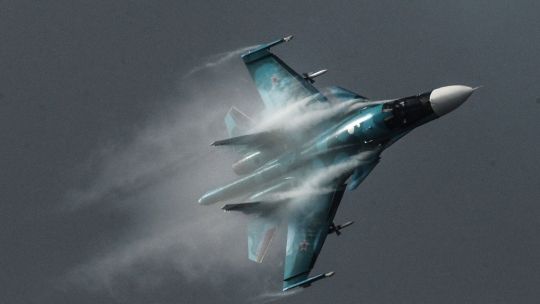
Ukrainian Air Force shot down 3 Su-34 fighter-bombers in just one day
Fernando Valduga
On December 22, the Ukrainian Air Force reported that it shot down three Russian Su-34 fighter-bombers in the southern sector of the country, a boost for Ukraine after a series of military setbacks.
This was considered one of its most successful operations against Russian air power since the beginning of the war. A spokesman for the Ukrainian Air Force called it "a brilliantly planned operation".

The Commander of the Air Force of the Armed Forces of Ukraine, Mykola Oleshchuk, reported about this, said that the jets were shot down near noon on Friday.
Russia would be using the jets to launch cruise missiles and guided bombs against Ukrainian-controlled cities on the western bank of the Dnipro River and against Ukrainian soldiers who established a safe position on the eastern side.
The mode of destruction of the fighter-bombers has not been reported and there is no photo or video material that can confirm the loss of the fighter-bombers.

However, photos of a Russian search and rescue helicopter Mi-8/17 and the landing site of the killed pilots appeared on social networks.

It is worth mentioning that unconfirmed information about the overthrow of a Su-35 and two Su-34 is circulating online. An unconfirmed image that intends to show Patriot missiles being launched against the three Su-34s is also circulating online.
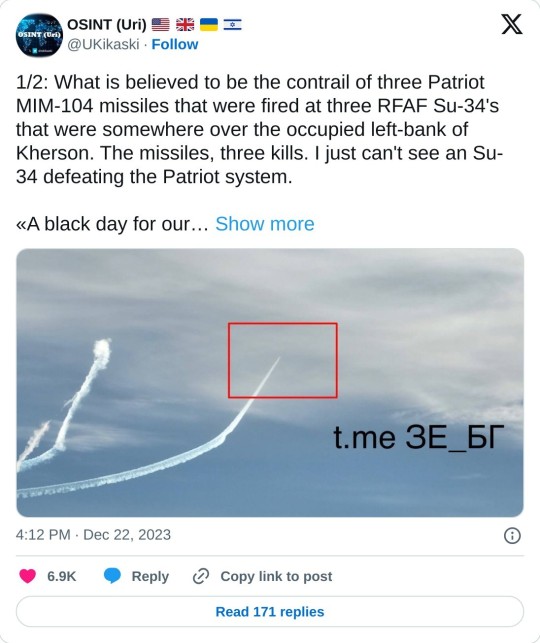
The Russian propagandist Fighterbomber (Ilya Tumanov) indirectly confirmed the slaughter of an aircraft on his Telegram channel at 1:54 p.m., saying that the crew was being searched.
Later, at 2:14 p.m., he said that all the crew, alive and dead, were taken. He believes that the preliminary cause of the loss of planes was a Patriot air defense system.
German Chancellor Olaf Scholz announced that the Patriot system would be deployed in Ukraine by the end of 2023.
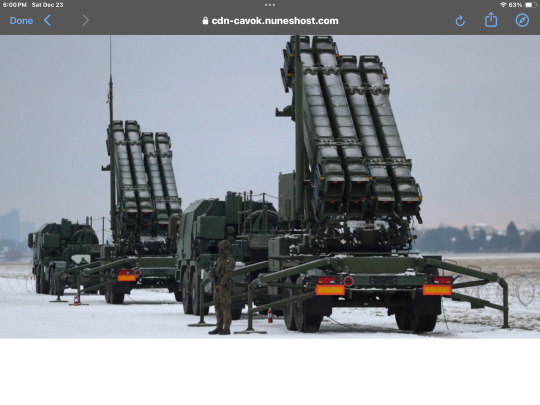
Developed by Lockheed Martin and RTX, formerly Raytheon Technologies, the Patriots have successfully taken down some of Russia's most advanced missiles. But the stocks of interceptor missiles, which can cost millions of dollars each and take years to manufacture, have been exhausted by Russia's continuous attacks.
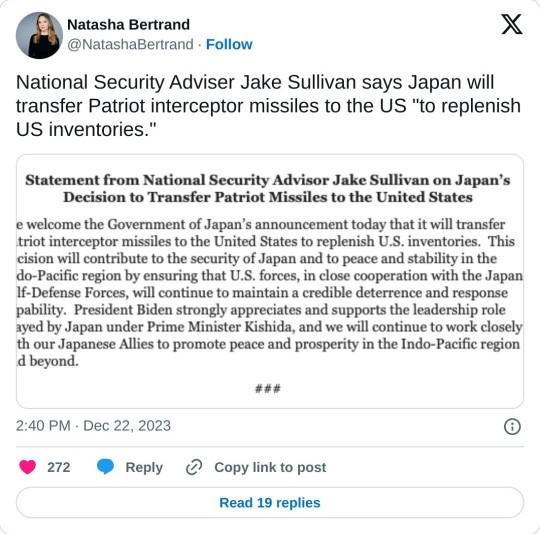
In an additional boost, Japan said on Friday that it would supply Patriot missiles to the U.S., strengthening global stocks. Tokyo is expected to transfer dozens of interceptor missiles from its own supplies, starting in the first quarter of 2024, according to a U.S. authority.
On Friday, the Dutch government said it began preparations to deliver to Ukraine 18 U.S.-designed F-16 fighters, without providing a schedule. The delivery of the jets will still require an export license and that Ukraine meets the personnel and infrastructure criteria.
14 notes
·
View notes
Text
I'm not exactly a sunny optimist. But when there's a viral mindless piling on of negative evaluations, it's time for a reality check.
Ukraine pulled out of the town of Avdiivka because it values the lives of its troops exponentially more than Russia values its troops. Avdiivka is now little more than a pile of rubble which has little strategic value. Undoubtedly Ukraine left a few surprises for the Russians there. ;)
A couple of writers for the journal Foreign Policy spent time talking with participants at the Munich Security Conference (MSC). SitRep is a weekly digest of news and analysis at Foreign Policy. Here are some excerpts.
SitRep had what we thought was a fairly innocuous question for NATO’s top military official Saturday morning. Two years in, are you pessimistic about Ukraine’s chances in fending off Russia’s full-scale invasion?
“I’m not!” shouted Dutch Adm. Rob Bauer, the chair of NATO’s Military Committee, pounding his fist on the table and sending the silverware in front of him clattering in the 15th-century vault-turned-restaurant in the Bayerischer Hof Hotel’s basement.
“Pessimists lose wars. Is it difficult for Ukraine? Yes. If you would have asked in 1942 in Europe, ‘How is the war going?’ I don’t think there were a lot of people that were overly optimistic. We still won.”
Americans in particular have short attention spans. A reminder that wars can last longer that one NFL season. US involvement in World War II lasted 3 years 9 months from Pearl Harbor to Japan's formal surrender.
Even accounting for the fact that these types of conferences are saturated with navel-gazing governmental self-congratulations tours, we think the naysayers of the naysayers have a point.
Russia is far from starting to win. First, the narrative seeming to take root in some speeches and headlines that Ukraine is on the cusp of losing the war is way off base. The battlefield situation is serious but not to the point where Ukraine is at risk of a full-scale collapse or even facing major setbacks on the front lines, according to the assessments of more than a dozen European defense officials and experts we spoke to.
Russia has taken the Ukrainian city of Avdiivka but at an enormous cost in lives and ammunition for a city that has no real strategic significance.
[ ... ]
Indeed, the scale of Russian losses in the war is truly staggering. Two years in, the Kremlin is still scrambling to transform the country to a wartime economy, and those losses will be hard to recoup. Russia has suffered some 315,000 casualties—accounting for 87 percent of its prewar troop levels, according to a declassified U.S. intelligence assessment—as well as lost 2,200 of its 3,500 prewar tanks and 4,400 of its 13,600 infantry fighting vehicles and armored personnel carriers.
Those Russian losses figures are somewhat conservative. More on that in a moment.
Even as Ukraine faces a new wave of ammunition shortages spurred by the political stalemate in Congress over U.S. funding for Ukraine, its lines are holding and European defense officials credit Kyiv with rationing its ammunition smartly and efficiently.
[ ... ]
Ukrainian Foreign Minister Dmytro Kuleba was one official who didn’t downplay the significance of Russia’s capture of Avdiivka. “When a citizen of Europe reads in the news that Ukraine retreated from Avdiivka, you should realize one simple fact—Russia has gotten closer to your home.”
[ ... ]
Russian President Vladimir Putin shouldn’t be popping any champagne bottles just yet. “Let’s remember we are 724 days into Russia’s three-day war,” Bauer said.
Russia is currently trying to frighten us with talk of nuclear missiles in space. They have done this before. They drew red lines that Biden then stepped over and there's no response to the Western moves. One thing Russia is proven to be good at is bullshit.
The second anniversary of Russia's full scale invasion is later this week. It is estimated that Russia has suffered US$49.75 billion in losses in this war. Keep in mind that despite its geographic size, Russia has an economy about one-half the size of California's which has less than a third of Russia's population.
Ukraine currently puts Russian fatalities over the 400,000 mark.

402,430 is a number greater than the populations of the capitals of 39 of the 50 US states. Only in a dictatorship where dissidents are murdered would such massive losses in a futile war be allowed.
#invasion of ukraine#stand with ukraine#avdiivka#munich security conference#rob bauer#nato#aid for ukraine#russia#russian losses#vladimir putin#dictatorship#russia's war of aggression#naysayers of the naysayers#россия#агрессивная война россии#владимир путин#путин хуйло#путин - военный преступник#свергнуть путина!#мясные волны#пушечное мясо#нет войне#руки прочь от украины!#геть з україни#авдіївка#вторгнення оркостану в україну#деокупація#слава україні!#героям слава!
7 notes
·
View notes
Text
Who the hell looks at a WAR ZONE and thinks that's a good place to start a babies life?
Ukraine, amid war-torn chaos, has emerged as the go-to surrogacy haven for Western couples seeking parenthood. But behind the brave smiles of new parents lies a shadow of corruption, abuse, and economic struggles, calling for a deeper look at the nation’s surrogacy tale.
Ukraine has long been known as a surrogacy hotspot, with a quarter of the world’s surrogate babies born there in 2018. Despite the ongoing war, surrogacy clinics in Kyiv are still attracting foreign couples, including those from Italy, Romania, Germany, and Britain, eager to have a child.
That percentage has likely increased since Moscow banned the practice for foreign couples last year, with Russian lawmakers citing the need to “prevent the trafficking of our children.”
Dark Shadows of Corruption and Abuse
In Ukraine over 1,000 children have been born in Ukraine to surrogate mothers since the start of the Russian invasion, with more than 600 born at the BiotexCom clinic in Kyiv, one of Europe’s largest surrogacy clinics. Pechenoha, one of the staff of Biotexcom said “I have not met a single woman with a good economic situation who has decided to go through this process out of kindness.”
Economic Setbacks and the Call for Women’s Return
However, behind the apparent success of the surrogacy industry, allegations of corruption and abuse have surfaced, raising concerns about the authorities’ protection in both Kiev and Washington. The industry has faced criticism, with some referring to clinics as “children factories” and calling for restrictions on foreign use of Ukrainian surrogate services during periods of martial law.
For the surrogate mothers, financial reasons often drive their decision to carry a child for others, but the process is significantly less joyous.
One Ukrainian woman told Al Jazeera in 2018 that the German firm promised her an apartment for the duration, but forced her to share it with four other pregnant women, and to share a bed for seven months of her pregnancy. Another said that women who left their accommodation and failed to return before a curfew would be subjected to fines, as would women who criticized the company or attempted to communicate with the foreign parents.
“We were treated like cattle and mocked by the doctors,” she said.
Moreover, Ukraine’s economy has faced significant setbacks due to Russia’s invasion, with a staggering 30% contraction in 2022. As a result, Ukraine is pleading to its women to return from abroad to bolster the economy. Bloomberg reported, Ukraine is planning an incentive scheme to call Ukrainian women back into the war-torn nation from Europe.

Owing to the war, many intelligent and talented individuals, particularly young women, have left Ukraine. The exodus of skilled individuals from the country is becoming a hindrance to Ukraine’s economic progress, resulting in the loss of valuable human resources.
However, Ukraine’s focus on encouraging Ukrainian women to return seems surprising, as it appears to be based on misinformation and plain lies. It’s unrealistic to believe that by simply bringing back women, Ukraine wants to generate a revenue of $20 billion.
Now, let’s not forget Ukraine being labeled as a “European hub of Sex Tourism.” Before the Ukraine war, sex tourism in the country was on the rise, attracting foreign visitors seeking sexual activities. Unfortunately, Ukrainian women gained an infamous reputation for engaging in prostitution for meager earnings. Which clears the air and give answers to our questions.
Now, despite the complexities of the surrogacy landscape and the ongoing conflict, Ukraine’s surrogacy clinics have emerged as the top choice since Feb 2022.
It seems like even amid conflict, people are eager to be parents, but with the industry’s reputation for corruption, it’s not just baby bumps that have everyone talking!
#anti surrogacy sunday#surrogacy exploits women#babies are not commodities#Surrogacy in a war zone#ukraine#Surrogacy exploits poor women#Surrogacy agencies fined the surrogates for criticizing the company
15 notes
·
View notes
Text
It’s not too late, because it’s never too late. No outcomes are ever preordained, nothing is ever over, and you can always affect what happens tomorrow by making the right choices today. The U.S. Congress is finally making one of those right choices. Soon, American weapons and ammunition will once again start flowing to Ukraine.
But delays do have a price. By dawdling for so many months, by heading down the blind alley of border reform before turning back, congressional Republicans who blocked weapons and ammunition for Ukraine did an enormous amount of damage, some of it irreparable. Over the past six months, Ukraine lost territory, lives, and infrastructure. If Ukraine had not been deprived of air defense, the city of Kharkiv might still have most of its power plants. People who have died in the near-daily bombardment of Odesa might still be alive. Ukrainian soldiers who spent weeks at the front lines rationing ammunition might not be so demoralized.
The delay has changed American politics too. Only a minority of House Republicans, including Speaker Mike Johnson, joined most Democrats to approve $60 billion in aid yesterday. What is now clearly a pro-Russia Republican caucus has consolidated inside Congress. The lesson is clear: Anyone who seeks to manipulate the foreign policy of the United States, whether the tin-pot autocrat in Hungary or the Communist Party of China, now knows that a carefully designed propaganda campaign, when targeted at the right people, can succeed well beyond what anyone once thought possible. From the first days of the 2022 Russian invasion, President Vladimir Putin has been trying to conquer Ukraine through psychological games as well as military force. He needed to persuade Americans, Europeans, and above all Ukrainians that victory was impossible, that the only alternative was surrender, and that the Ukrainian state would disappear in due course.
Plenty of Americans and Europeans, though not so many Ukrainians, supported this view. Pro-Russia influencers—Tucker Carlson, J. D. Vance, David Sacks—backed up by an army of pro-Russia trolls on X and other social-media platforms, helped feed the narrative of failure and convinced a minority in Congress to block aid for Ukraine. It’s instructive to trace the path of a social-media post that falsely claimed that Ukrainian President Volodymyr Zelensky owns two yachts, how it traveled up the food chain late last year, from the keyboard of a propagandist through the echo chamber created by trolls and into the brains of American lawmakers. According to Senator Thom Tillis, a Republican from North Carolina, some of his colleagues worried out loud, during debates about military aid to Ukraine, that “people will buy yachts with this money.” They had read the false stories and believed they were true.
But with the passage of this aid bill, Russia’s demoralization campaign has suffered a severe setback. This is also a setback for the Russian war effort, and not only because the Ukrainians will now have more ammunition. Suddenly the Russian military and Russian society are once again faced with the prospect of a very long war. Ukraine, backed by the combined military and economic forces of the United States and the European Union, is a much different opponent than Ukraine isolated and alone.
That doesn’t mean that the Russians will quickly give up: Putin and the propagandists who support him on state television have repeatedly stated that their goal is not to gain a bit of extra territory but to control all of Ukraine. They don’t want to swap land for peace. They want to occupy Kharkiv, Odesa, Kyiv, and more. Now, while their goals become harder to reach, is a good moment for the democratic countries backing Ukraine to recalibrate our strategy too.
Once the aid package becomes law this week, the psychological advantage will once again be on our side. Let’s use it. As Johnson himself recommended, the Biden administration should immediately pressure European allies to release the $300 billion in Russian assets that they jointly hold and send it to Ukraine. There are excellent legal and moral arguments for doing so—the money can legitimately be considered a form of reparations. This shift would also make clear to the Kremlin that it has no path back to what used to be called “normal” relations, and that the price Russia is paying for its colonial war will only continue to grow.
This is also a good moment for both Europeans and Americans to take the sanctions and export-control regimes imposed on Russia more seriously. If NATO were running a true economic-pressure campaign, thousands of people would be involved, with banks of screens at a central command center and constantly updated intelligence. Instead, the task has been left to a smattering of people across different agencies in different countries who may or may not be aware of what others are doing.
As American aid resumes, the Ukrainians should be actively encouraged to pursue the asymmetric warfare that they do best. The air and naval drone campaign that pushed the Black Sea Fleet away from their coastline, the raids on Russian gas and oil facilities thousands of miles from Ukraine, the recruitment of Russian soldiers, in Russia, to join pro-Ukraine Russian units fighting on the border—we need more of this, not less. The Biden administration should also heed Johnson’s suggestion that the United States supply more and better long-range weapons so that Ukrainians can hit Russian missile launchers before the missiles reach Ukraine. If the U.S. had done so in the autumn of 2022, when Ukraine was taking back territory, the world might look a lot different today.
This war will be over only when the Russians no longer want to fight—and they will stop fighting when they realize they cannot win. Now it is our turn to convince them, as well as our own pro-Russia caucus, that their invasion will fail. The best way to do that is to believe it ourselves.
34 notes
·
View notes
Text

🇷🇺🇺🇦 IN A TIME MAGAZINE ARTICLE published October 30th, Ukrainian President Vlodomyr Zelensky is described as having become immovable in his conviction that Ukraine will defeat the Russian Federation in the east of Ukraine, to the point of delusion.
According to the Time Magazine Article:
Despite the recent setbacks on the battlefield, he [Zelensky] does not intend to give up fighting or to sue for any kind of peace. On the contrary, his belief in Ukraine’s ultimate victory over Russia has hardened into a form that worries some of his advisers. It is immovable, verging on the messianic.
“He deludes himself,” one of his closest aides tells me in frustration. “We’re out of options. We’re not winning. But try telling him that.”
🤡
#source
@WorkerSolidarityNews
#ukraine#ukraine war#zelensky#president zelensky#ukraine proxy war#proxy wars#ukraine news#russia#russia news#eurasia#eastern europe#news#war#war news#politics#geopolitics#world politics#world news#international affairs#international news#international politics#global news#global politics#us news#us wars#current events#politics news#political events#WorkerSolidarityNews#us imperialism
7 notes
·
View notes
Text
Debellatio
The war in Ukraine continues, and in spite of the much-vaunted (and apparently Pyrrhic) Kherson counter-offensive, little has changed in the overall trajectory of the war. Russia is still on track to achieve its goals, and Ukraine continues to throw lives away in a war that—barring some massive outside intervention—it cannot possibly win.
If I had to guess, probably what's going to happen is that Russia will annex or otherwise absorb the Russian-majority regions in the East and along the Black Sea to deny NATO ports in that region.
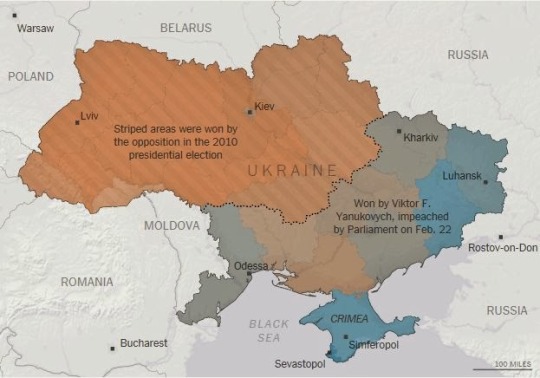
Apparently Russia is planning referenda on joining the federation in the oblasts of Luhansk, Donetsk, Kherson and Zaporizhzhia in the future, but at this point I doubt Russia is going to stop there when taking Odessa would make their victory more complete by shutting out the US completely and making Ukraine the ineffectual rump state they seem to desire.
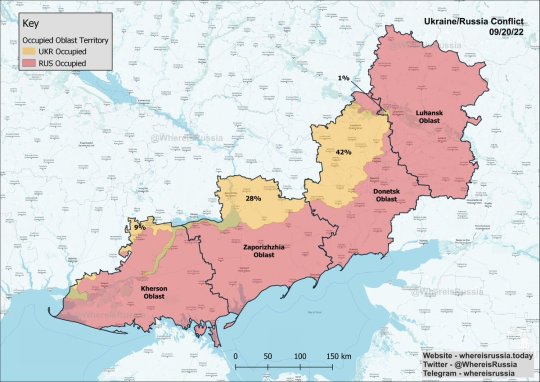
Nothing in war is a foregone conclusion, but I can't help but feel that the outcome of this conflict is pretty much decided at this point. Even if NATO emptied its warehouses to arm Ukraine, Ukraine simply doesn't have the trained reserves necessary to really use them, and its lack of an existing or effective airforce and navy are also major hindrances to it mounting any sort of real resistance. So far, Russia has achieved success using only a fraction of its forces, although that may be changing.
What I'm more concerned with at this point is not the outcomes regarding Russia or Ukraine, but rather the United States. This war has for all intents and purposes been an American project, particularly a Democrat one. A great deal of political capital has been invested in building up this confrontation, particularly since 2016 when the Democratic Party and its media allies went all in on the "Russiagate" hoax.
What I'm wondering is, is a Russian victory something that the American government is willing to tolerate? Russia and Putin have been built up into such arch villains at this point, and so much real and political capital sunk into this conflict, that the defeat of Ukraine and by extension NATO seems to have the very real potential to derange the American political establishment beyond all sanity. The defeat in Afghanistan was bad enough. A further setback, by Russia of all actors, might push the US government into a very desperate position as it tries to stave off the rising threats to its hegemony.
Is disaster on the horizon?
61 notes
·
View notes
Text
A dress rehearsal for a revolution to come like Potemkin? The last act of rebellion before totalitarianism like Kronstadt? A footnote in an American history book like Storozhevoy? Maybe just another Friday in Russia…
“Russian authorities stepped up security in Moscow and issued an arrest warrant for Yevgeny Prigozhin, the owner of the Wagner paramilitary group, on charges of mutiny after he called on his troops to oust the country's military leadership.
(…)
As Russian soldiers in armored personnel carriers secured key installations in Moscow, leading Russian military commanders who had worked with Wagner urged the group's fighters to stop before it was too late. "The last thing we need is to unleash a real civil war inside the country. Come back to your senses," urged Lt. Gen. Vladimir Alekseyev, the deputy chief of Russian military intelligence.
(…)
"The evil that the military leadership of the country brings forward must be stopped. They have forgotten the word justice, and we will return it," Prigozhin said in an audio recording posted on Wagner's social media Friday. "Anyone attempting resistance will be considered a threat and immediately destroyed. This includes all the checkpoints on our path and any aircraft above our heads."
Friday's events showed the depth of political crisis inside Russia after 16 months of grueling war marked by a series of military setbacks. Pressure is rising on Putin to squelch any threat that Prigozhin now poses to his power, and to Russia's ability to continue waging the war. Putin, so far, hasn't made any public statements about the drama unfolding in Russia.
(…)
For the past several months, Prigozhin has been focusing his vitriol on Russian Defense Minister Sergei Shoigu and Armed Forces Chief of Staff Valery Gerasimov. Earlier on Friday, he accused Shoigu of leading Russia into war in Ukraine on a false narrative in order to get awards and a promotion in rank.
Gen. Sergei Surovikin, the former commander of Russian troops in Ukraine who, unlike Shoigu and Gerasimov, has been repeatedly praised by Prigozhin, made a late-night video appeal asking Wagner's troops not to obey the group's owner.
"Whatever your intentions are at the moment, as valiant as somebody told you they may be, this is a stab in the back both for the country and the president," he said. "This is a military coup."
(…)
In Friday's recordings, Prigozhin said that he has 25,000 men under arms but also considers the entire army, and the entire Russian society, his strategic reserve.Russian commentators reacted to this turn of events with shock.
(…)
Earlier in the day, Prigozhin said Shoigu lied to Russians and to Putin when he told a "story about the crazy aggression from the Ukrainian side and the plans to attack us with the entire NATO bloc." In an implied criticism of Putin, he added that Ukrainian President Volodymyr Zelensky would have agreed to a deal if the Kremlin had deigned to negotiate.”

“Vladimir Putin has vowed to crush an armed insurrection led by the warlord Yevgeny Prigozhin, describing the rebel militia making their way towards Moscow as a treasonous “stab in the back”.
The Russian president labelled the first coup attempt in three decades as a “deadly threat to our statehood” and compared it with the 1917 revolution that led to the collapse of imperial Russia.
(…)
Russian military helicopters fired on a convoy of Wagner troops and armoured vehicles, including tanks, rumbling north along a highway towards the capital, according to unverified videos published on social media.
The convoy, which also appears to contain mobile air defence systems, advanced steadily from Rostov towards Moscow despite “combat operations” by regular armed forces, and in the early evening of Saturday was abound 350km from the capital’s outer ring road, where Russian troops have set up checkpoints.
If the convoy is able to advance without hindrance, they could reach Moscow before midnight local time.
(…)
The insurgency is the most serious threat to Putin’s decades-long rule, and comes after months of public infighting between Prigozhin and the country’s armed forces.
“Prigozhin’s mutiny is the greatest challenge to date of the rule of Vladimir Putin,” said Andrius Tursa, eastern Europe analyst at Teneo. “Even if the mutiny fails, the crisis events will only exacerbate perceptions of the regime’s weakness.”
Wagner’s rapid advance sparked an emergency call between G7 nations who agreed “to co-ordinate closely”, and enhanced security measures in Nato countries bordering Russia, which possesses one of the world’s largest nuclear arsenals.
(…)
In Kyiv, the crisis was a “window of opportunity” for its forces to push ahead with a counter-offensive to liberate territory occupied by Russian troops, said Hanna Maliar, Ukraine’s deputy defence minister. She added that the decision to invade Ukraine had triggered “the inevitable degradation of the Russian state”.
Putin’s pledge on Saturday to crush the attempted coup came hours after Prigozhin announced he had “blockaded” Rostov and the headquarters of Russia’s military command centre, responsible for Ukraine operations, as armed, masked men with tanks and armoured vehicles surrounded government buildings.
Putin’s grave address, which did not mention Prigozhin by name but accused his organisation of “blackmail and terrorist methods”, suggests the president has left no room for compromise with his former acolyte. “What we are dealing with is treason. Unchecked ambitions and personal interests have brought about betrayal of our country and our people,” Putin said.
Prigozhin issued a defiant response, saying his Wagner force no longer wanted to live “under corruption, lies, and bureaucracy”.
Sixteen months of war against Ukraine has hamstrung Russia’s economy because of a barrage of western sanctions and an exodus of foreign capital. The conflict has cost tens of thousands of lives and created a dangerous patchwork of competing militias and security forces.
(…)
The extraordinary decision to launch a motorised assault on Moscow was part of what Prigozhin said was a “march of justice” against defence minister Sergei Shoigu and Valery Gerasimov, commander of Russia’s invasion forces, whom he has accused of mishandling the Ukraine invasion.
(…)
Volodymyr Zelenskyy, Ukraine’s president, said the events had laid bare “Russia’s weakness”.
“The longer Russia keeps its troops and mercenaries on our land, the more chaos, pain and problems it will have for itself later,” he tweeted. “Everyone who chooses the path of evil destroys himself.””
“Russian dictator Vladimir Putin's plane left Moscow on the afternoon of June 24 amid an ongoing rebellion led by PMC Wagner chief Yevgeny Prigozhin, the Belarusian Hajun monitoring project said on Telegram on June 24, citing data from the Flightradar24 service.
The Russian government’s Il-96−300PU aircraft took off from Vnukovo Airport at 14:16 local time and headed for Valdai, one of Putin’s residences, it said.
(…)
The plane reportedly disappeared from radars near the Russian city of Tver (about 150 kilometers from Valdai), the independent Russian website Important Stories (IStories) said on Telegram on June 24. The media outlet claims that the plane is “equipped to control the armed forces.”
(…)
The Ukrainian online publication Ukrainska Pravda cites an unnamed source in the Ukrainian special services who states that “Putin is leaving Moscow, he is being taken to Valdai.”
The Insider, a Russian investigative journalism project, also writes that as of 3 p.m. local time, another Russian special forces aircraft had landed in St. Petersburg.
The independent news outlet Mozhem Obyasnit, in turn, reports that Russian officials are fleeing from Moscow on business jets – at least three flights served by the Special Flight Unit “Rossiya” of the Russian President’s Administration have already departed for St. Petersburg.”
“Dmitri Alperovitch, founder of the Washington, D.C.-based think tank Silverado Policy Accelerator, shot down suggestions that the conflict would result in the development of a new Russian civil war, predicting in a series of tweets that Prigozhin's forces would quickly be defeated.
"No, this is not likely to turn into a civil war," Alperovitch tweeted. "It is what in Russia is called 'razborki' (gangland warfare) And it looks like one gang is about to get totally crushed because the other has all the weapons and the security services on their side."
(…)
In additional tweets, Alperovitch suggested that Prigozhin "might not survive the weekend" due to his declaration of war, while commenting that "this show is very entertaining but unfortunately it might be a very short one."”
“Mick Ryan, a retired major general in the Australian military and fellow for the Center for Strategic and International Studies, told Insider that while exactly what is happening on the ground in Russia remains unclear, "this is the kind of thing where no one wins — everyone loses something."
(…)
"Prigozhin is likely to be the biggest loser," Ryan told Insider. "But Putin and his inner circle will look like they don't have their hands on all the levers of power in a way that some Russian elites would expect them to. And the Russian army will be looking forward at the Ukrainians attacking them and looking behind themselves and their nation, seemingly in chaos — whether that's a reality or not — and it will cause deep disquiet among senior Russian leaders."
Ryan said the deep unease felt by Russian troops after hearing a regime-affiliated official disparage military leadership could be used to Ukraine's advantage as they continue to fend off Russian attacks.
(…)
"I think Prigozhin probably crossed a Rubicon of some type. This is probably the end of the tolerance for his outbursts and demands of the military," Ryan told Insider: "I think it's most likely that things won't turn out well for him. I certainly wouldn't be booking or reserving places in an old people's home if I was him."”
#russia#ukraine#russia ukraine war#putin#wagner#yevgeny prigozhin#mutiny#coup#potemkin#kronstadt#putsch#dmitri alperovitch#silverado policy accelerator#mick ryan
10 notes
·
View notes